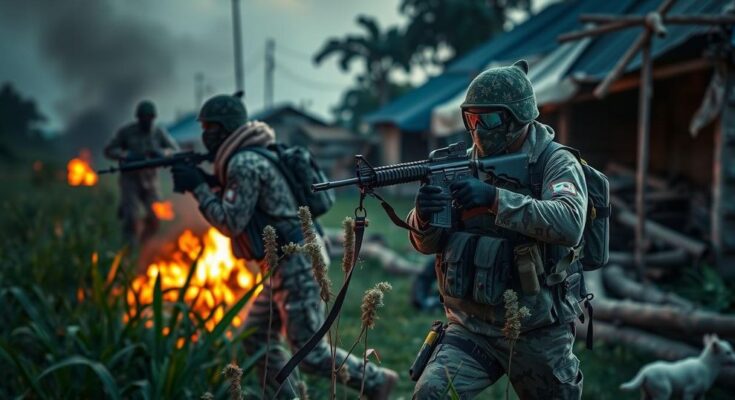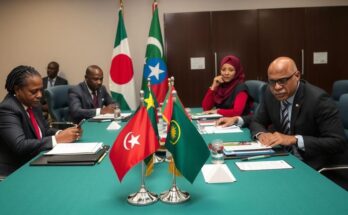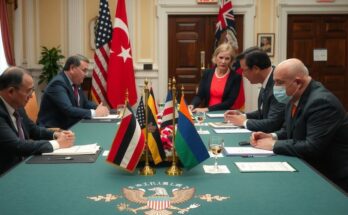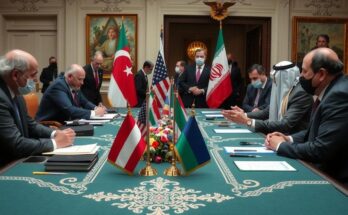The recent attack by the jihadist group Lakurawa in Nigeria’s Mera village has resulted in the deaths of 15 people, amid rising violence in northwest Nigeria linked to the emergence of this group. Authorities have expressed concerns over their presence, capabilities, and influence, as they impose a strict interpretation of sharia law and engage in criminal activities across local communities.
On Friday, gunmen, reportedly part of a newly emerged jihadist group known as ‘Lakurawa’, attacked the village of Mera in northwest Nigeria, resulting in the deaths of 15 individuals. This brutal assault occurred approximately 50 kilometers from the Niger border and was described by Kebbi State’s deputy governor, Umar Tafida, as being conducted by ‘unknown gunmen’. In light of this incident, security officials have expressed concern regarding the presence of the Lakurawa group, which is believed to have crossed from Mali and Niger. Their activities, characterized by armed assaults and imposition of a strict interpretation of sharia law, pose significant threats to local communities. The insurgency in Nigeria has a long history, stemming from the rise of Boko Haram in 2009, which initiated a cycle of violence that has since included numerous splinter groups and a surge in armed banditry throughout the region. Notably, the United Nations has indicated that the unrest in northwest Nigeria could lead to severe food insecurity for millions of individuals in the coming year. The deputy governor of Kebbi State, Umar Tafida, attended the funeral for the victims of the Mera attack, which took place shortly after the incident. This tragic event highlights the escalating violence and instability in the region, as various local leaders reported that the Lakurawa group appeared equipped with advanced weaponry and has preemptively established camps in neighboring forests. The group’s emergence has been causing unrest across five local government areas, where they exert influence over the communities by encouraging insurrection against secular authorities and promoting their extremist agenda. The grave implications of their actions were underscored when community leader Bashir Isah reported on villagers’ attempts to defend their livestock during the mosque prayers, which ultimately proved fatal against the well-armed assailants. Furthermore, it has been reported that this group utilizes financial incentives to recruit young men from local villages, thereby deepening their foothold in the region. The ongoing violence in Nigeria’s northwest is indicative of a broader pattern of armed conflict that has plagued the nation since the emergence of Boko Haram. This historical context is critical to understanding the current situation, as various Islamist factions have risen alongside increased cases of armed robbery and kidnappings. While the Nigerian military has attempted to regain control and safety, these efforts continue to be challenged by the agility and sophistication of groups like Lakurawa. Moreover, the socio-economic ramifications of such conflicts cannot be overstated, as they contribute directly to a looming humanitarian crisis. Following the most recent attack, the distress of local populations is palpable, and coordinated efforts are urgently needed to address both the immediate threats posed by insurgency and the underlying issues that fuel such violence. Although specific citations from the original article could not be directly indicated, the alarming nature of the violence and the implications for local communities serve to reinforce the urgent need for a comprehensive response to ensure stability in the region. Each account from local officials and community members provides an invaluable perspective on the situation, emphasizing the complexity and severity of the current security landscape in northwest Nigeria. The recent surge of violence in Nigeria, particularly in the northwest region, reflects the alarming rise of jihadist groups such as Lakurawa. As they intensify their violent tactics and exploit the vulnerabilities of local communities, the government, alongside international partners, must prioritize their response strategies to mitigate the imminent threat to civilian lives and preserve regional stability. Additionally, addressing the humanitarian implications tied to the conflict will be vital in preventing further exacerbations of food insecurity and socio-economic deterioration in affected areas. “The group possessed sophisticated weapons and their criminal activities were observed in about five local government areas of the state.” – Idris Muhammad Gobir. The situation requires collaboration and a unified approach to confront the new challenges posed by the rising insurgency and the intricate web of violence affecting the region. A multi-faceted strategy that addresses not only security but also socio-economic challenges is essential to restore hope and normalcy in Nigerian communities.
The article discusses a recent attack on a village in Nigeria by a group known as Lakurawa, which has roots linked to Islamist movements from Mali and Niger. This incident showcases the escalating violence that has plagued Nigeria’s northwest, driven largely by the rise of jihadist factions and the breakdown of security in the region. The emergence of Lakurawa heightens concerns about the ongoing cycle of violence, banditry, and communal clashes that threaten stability and humanitarian conditions in Nigeria as the country grapples with effects such as famine and food insecurity, exacerbating the crises faced by the population.
In conclusion, the emergence of the Lakurawa jihadist group in northwest Nigeria signifies a troubling escalation in violence, with the attack on Mera resulting in significant loss of life. The ongoing conflict has roots in the historical rise of Boko Haram and its splinters, pointing to a complex landscape of insecurity. To prevent further loss of life and address the underlying causes of this turmoil, comprehensive strategies involving security, humanitarian aid, and community engagement are essential. The international community’s responsiveness will also be crucial in restoring stability and ensuring the welfare of affected populations.
Original Source: thedefensepost.com




